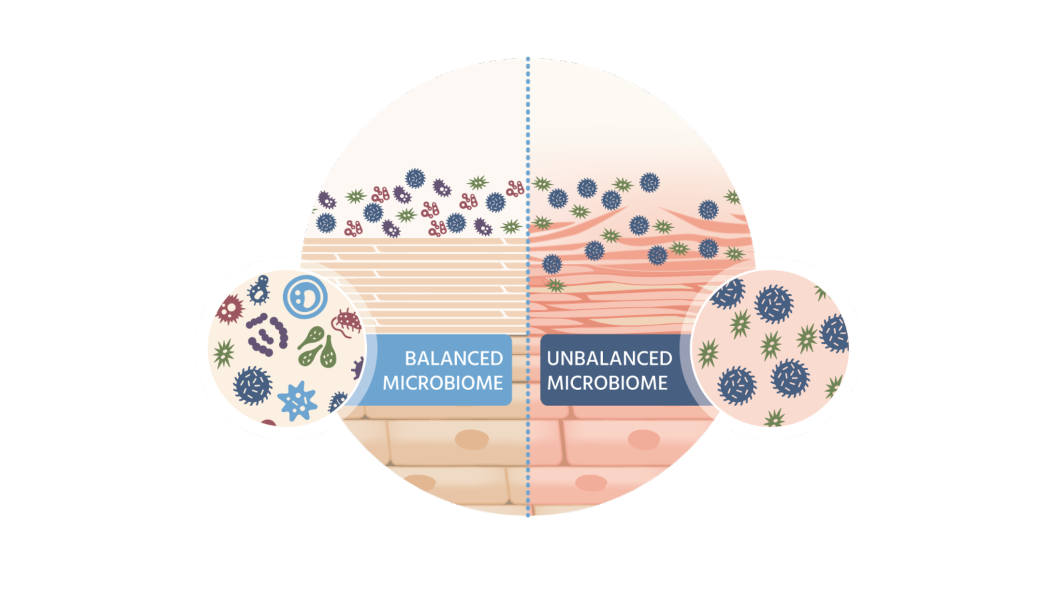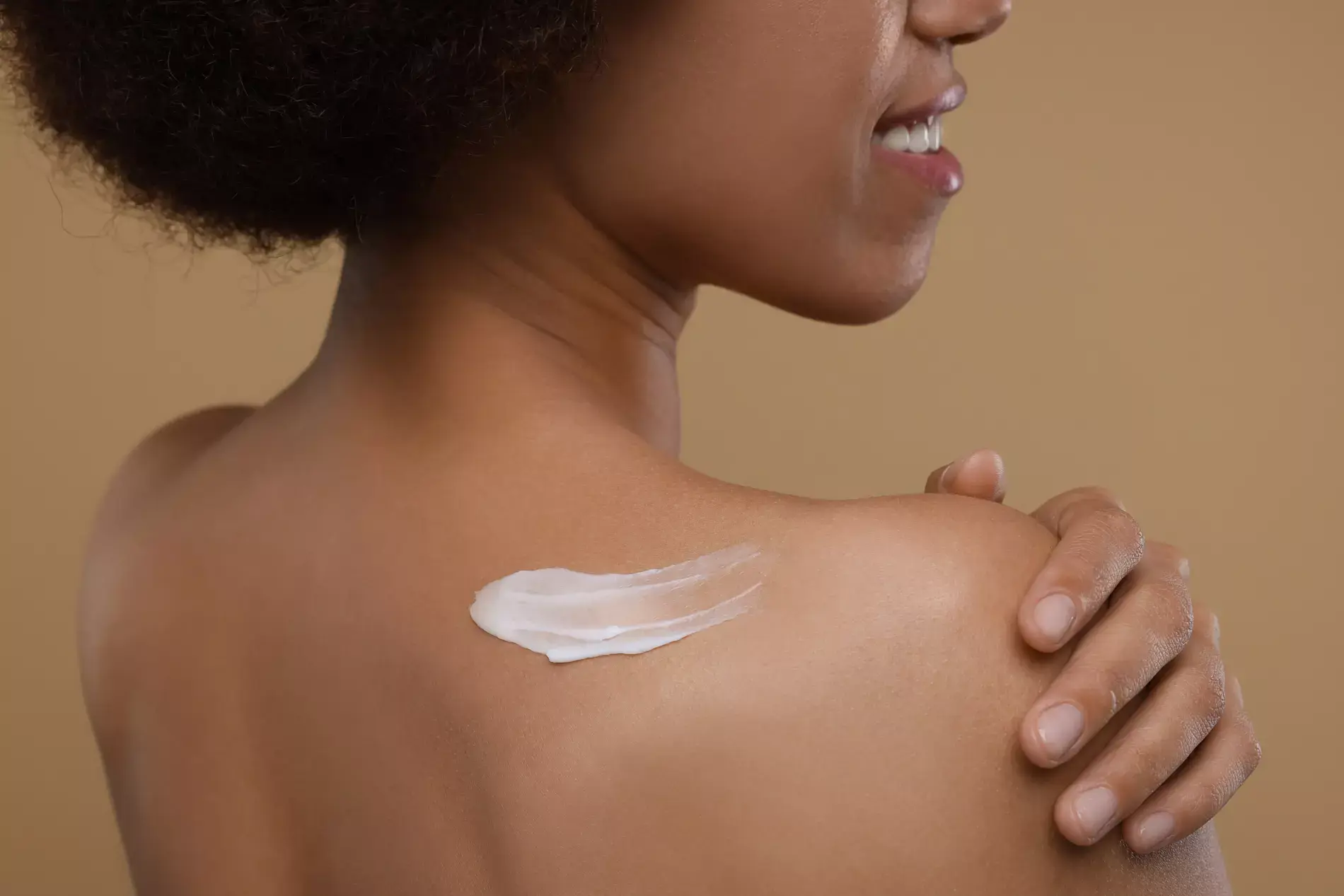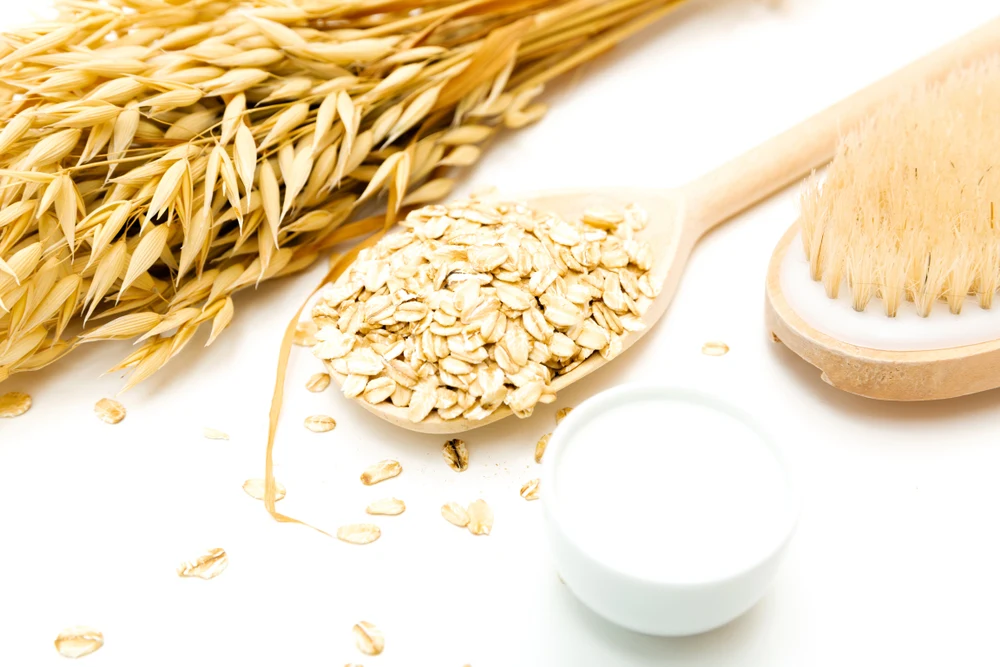The body’s largest organ is a marvelous thing. Did you know that the skin is a complex ecosystem that houses trillions of bacteria, fungi, and viruses? These microorganisms compose what’s called the skin microbiome.
Don’t reach for the hand-sanitizer just yet! Many of these microorganisms are beneficial and even essential to your skin and overall health. How can this be? Read ahead to learn more about the skin microbiome, how it relates to the gut microbiome, and what steps you can take to keep these systems healthy, helping your skin feel and look its best.
What is the Skin Microbiome?
The human skin serves as the first line of defense against environmental factors, and the vast diversity of bacteria, fungi, and viruses that dwell within the skin’s surface are a critical part of that defense. The skin microbiome—that collective community of microorganisms within the skin’s surface—is essential for maintaining skin barrier function. By playing a role in physical, chemical, microbial and immunological ways, a healthy skin microbiome can help defend against infection, heal wounds, control inflammation, and communicate with your immune system when it contacts harmful bacteria or viruses.
You may already realize that other microbiomes play a role in your overall health. The gut microbiome, for instance, is the ecosystem of microorganisms that exist within your digestive tract, playing a key role in digestion, immunity, and even neurological health. A balanced gut microbiome—much like a balanced skin microbiome—is flush with good bacteria that can help regulate the bad bacteria that cause infection. It should come as no surprise, then, that there is a relationship between the gut and skin microbiomes, and maintaining the health of one can help bolster the health of the other.
Functions of the Skin Microbiome
The microbiome of the skin serves several key functions:
Protection against pathogens: The healthy bacteria in your skin can help fight against harmful bacteria, germs, and pathogens, preventing potential infection. Additionally, microbes in your skin can act as a sort of warning signal to your immune system that harmful bacteria or viruses are trying to enter the body.
Regulation of Skin pH and moisture: Good bacteria in the skin are responsible for keeping the skin acidic (low pH). By keeping the skin’s pH level low, the microbiome becomes less hospitable to harmful germs. Additionally, it’s believed that certain bacteria can help us retain moisture, keeping skin supple, smooth, and youthful looking.
Influence on skin barrier function: The skin barrier function is vital for protecting against environmental aggressors like pollutants and allergens. A robust skin barrier helps lock in moisture while keeping out harmful substances. When in balance, the microbiome supports lipid and protein production, essential for barrier repair and maintenance.
Impact of the Gut Microbiome on the Skin
Have you ever noticed that your skin isn’t at its best if you are suffering from stomach flu or eating too many fried and fatty foods? It’s not a coincidence. When the microbiome in your gut is thrown off balance, it can have real effects on your skin’s microbiome as well. This relationship is known as the gut-skin axis.
Research published in the World Journal of Dermatology found that changes in the gut microbiome can impact patients with certain dermatological diseases. Eating healthy, fiber-rich foods can help build good gut bacteria through fermentation, which in turn can boost the skin's ability to fight off bad bacteria and retain moisture. Studies suggest that probiotics (good gut bacteria) may have a role in the treatment of eczema, particularly because they improve the diversity of the intestinal flora.
Other skin issues are also influenced by the gut microbiome. For these reasons, your dermatologist may inquire about your diet. They'll be able to give you a detailed explanation of why certain foods cause flareups and how to avoid inflammation.
While research around the connection between a healthy gut and healthy skin looks promising, it's still an emerging field; researchers are continuing to gather data on the state of skin before and after a gut health diet. This is all to say, keep an eye out for new research — it'll all work toward helping you make better food choices that will support healthy, glowing skin!
Other Factors that Impact the Skin Microbiome
In addition to your gut health, other factors that can disrupt the microbiome of the skin include:
Genes
Lifestyle choices like smoking and drinking alcohol
Environment
Air Pollution
Exposure to UV light
Skin Conditions Linked to the Microbiome
The skin microbiome can become unbalanced, meaning there is an overgrowth of harmful bacteria, viruses, or fungi. This imbalance, called dysbiosis, has been associated with several skin conditions, including:
Eczema (atopic dermatitis)
Psoriasis
Acne
Rosacea
Wounds that will not heal.
Maintaining a Healthy Skin Microbiome
So, what are the keys to microbiome and skin care?
Keep your gut microbiome in check
As explained above, there is a correlation between balanced gut bacteria and skin health. Indeed, maintaining your gut microbiome can also keep your skin feeling and looking its best. Encourage microbial diversity by promoting healthy gut bacteria and eating healthy foods. Probiotics can help the proliferation of healthy bacteria in the gut, which can stimulate beneficial skin bacteria. Probiotics can be found in fermented foods such as:
Yogurt
Kefir
Sauerkraut
Kimchi
Pickles
Certain cheeses
Sourdough bread
Meanwhile, prebiotics are a type of fiber that feed your friendly gut bacteria, and can be found in foods like:
Oats
Onion
Garlic
Bananas
Apples
Legumes
Develop a skincare routine that promotes a balanced microbiome
Supporting the health and resilience of your skin microbiome requires a skincare routine that nurtures and protects its natural barriers.
Gentle cleansers remove dirt and impurities without stripping away essential moisture.
Instead of harsh soaps that could wash away healthy bacteria, opt for body washes formulated with gentle ingredients like Prebiotic Oat. Body products formulated for sensitive skin will keep your skin healthy-looking and soft.
After washing, keep your skin barrier well-hydrated by using a moisturizer made with Prebiotic Oat. Daily use of moisturizing body products can reduce dryness and the likelihood of irritation.
Love the skin you’re in with AVEENO®
Aveeno® is here to help with original skin care products formulated to be suitable for sensitive skin. Using the power of ingredients like Oat, Aveeno® is committed to making every person feel comfortable, healthy, and beautiful in their own skin.




